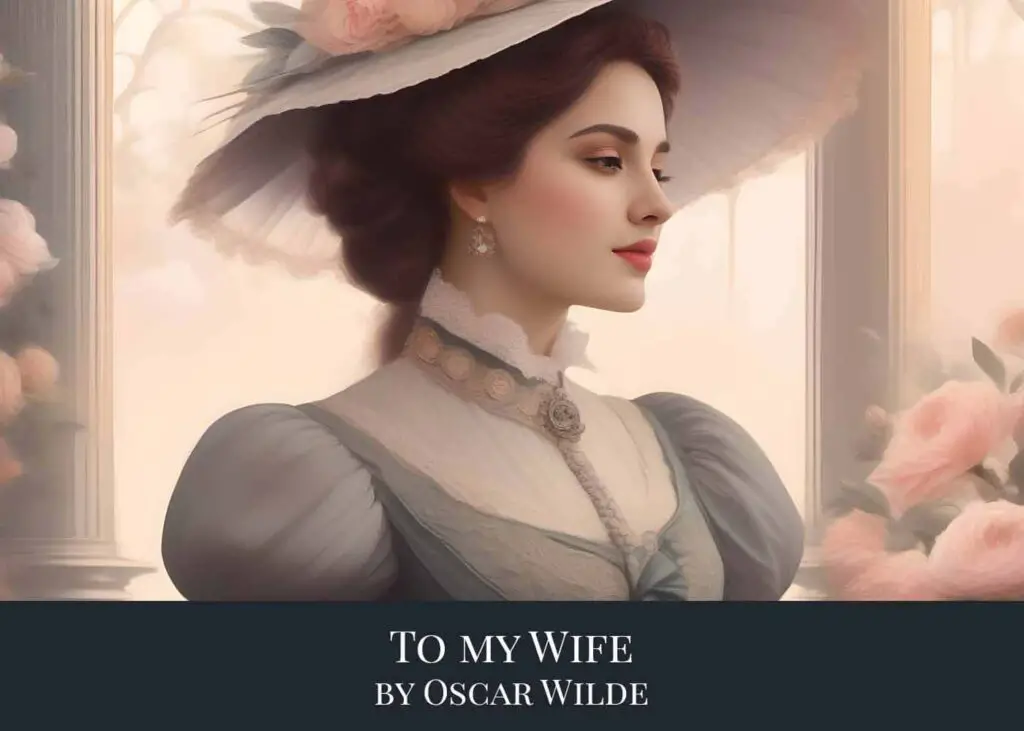
To my Wife by Oscar Wilde
“To My Wife” is a poem by Oscar Wilde, featured in his poetry collection Poems. This piece reflects Wilde’s unique poetic style, characterized by its eloquence and depth of emotion. In this poem, Wilde uses the metaphor of fallen petals to convey feelings of love and adoration. The verses capture the essence of a heartfelt message from a poet to his beloved, illustrating the enduring nature of love against the backdrop of changing seasons. For those interested in exploring more of Wilde’s evocative poetry, Poems is available at PageVio.
1. The Poem
I can write no stately proem
As a prelude to my lay;
From a poet to a poem
I would dare to say.
For if of these fallen petals
One to you seem fair,
Love will waft it till it settles
On your hair.
And when wind and winter harden
All the loveless land,
It will whisper of the garden,
You will understand.
Size: 8″ x 12″ (2:3 ratio)
Format: PDF
Copyright information: For personal use only
Note: Actual poster background color is white. For the sample poster, the background is made gray for illustration purpose.
2. To my Wife Analysis
This poem is a gentle and romantic piece that conveys the power and beauty of poetry in capturing and expressing emotions. Here’s a breakdown of its meaning:
First Stanza:
The speaker modestly claims that he cannot write a “stately proem” (a formal prelude or introduction) to their poem. This suggests a humble approach to their craft. “From a poet to a poem” implies a transformation or journey from the creator to the creation, highlighting the deep connection between a poet and their work. The line “I would dare to say” shows a bit of courage or boldness in expressing their thoughts, despite the initial modesty.
Second Stanza:
The “fallen petals” symbolize the poet’s words or verses, delicate and beautiful. The speaker hopes that if even one of these petals/verses appeals to the reader (“One to you seem fair”), love will carry it to them, as gently as a petal settling on hair. This stanza speaks to the intimate connection between the poet’s words and the reader, with the hope that the reader will find beauty and meaning in at least part of the poem.
Third Stanza:
The imagery shifts to a harsher, colder scene with “wind and winter” hardening the land, symbolizing times of emotional desolation or hardship. The speaker suggests that in such loveless, difficult times, the memory or the words of the poem (“It will whisper of the garden”) will bring back a sense of warmth, hope, or remembrance of happier times. “You will understand” indicates that the deeper meaning or comfort of the poem will become clear in such moments, suggesting the enduring power of poetry to provide solace and understanding.
Overall, the poem highlights the transformative and comforting power of poetry. It suggests that poetry can create a lasting connection between the speaker and the reader, offering beauty, hope, and understanding, especially in times of hardship.
3. Conclusion
We hope that Oscar Wilde’s “To My Wife” has resonated with you. Feel free to discover more of Oscar Wilde’s poetry for further inspiration.